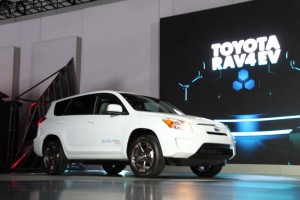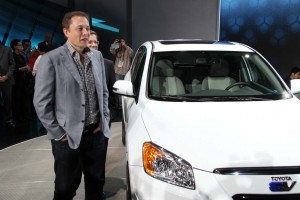As the legendary Yogi Berra might have said, it was “déjà vu all over again” for Toyota at the 2010 L.A. Auto Show, the company unveiling its new RAV4-EV.
Fourteen years ago, recalled the Japanese maker’s top American executive, Toyota came to the Los Angeles show to reveal another electric vehicle dubbed the RAV4-EV. That model, which went on sale in 1997, was a flop on the market due to the limitations of the battery technology of that era. But while CEO Jim Lentz and other Toyota executives said the latest lithium-ion batteries are making great technical strides, they took a cautious and conservative tone when describing the prospects of the latest model to bear the RAV4 EV nameplate.
Batteries were “the critical failing” of Toyota’s first battery-powered crossover, “and remain so,” cautioned Lentz, even as he unveiled the new model and revealed plans to begin fleet testing almost immediately.
But by the time it actually reaches consumers, said Lentz, Toyota is betting there will be significant advances in the design of the latest RAV4-EV that could make it much more attractive to a mainstream market. For that, credit little Tesla, the Silicon Vally-based start-up that launched its own battery-powered Roadster two years ago.
In an unusual move, Toyota has not only invested $50 million in Tesla but partnered with the start-up to develop the new RAV4-EV. The California firm will provide the powertrain, including the RAV4-EV’s battery pack.
“This unique relationship,” as Lentz described it, fits in with the strategy of Toyota Motor Co. CEO Akio Toyoda to try to turn his company into something that has a quicker, more entrepreneurially approach.
Initially, in what Toyota has dubbed Phase 0, the partners are using a relatively stock version of the RAV4, replacing the gasoline engine with a Tesla-made electric drivetrain. The result is a vehicle weighing in about 220 pounds heavier than the stock crossover.
The goal is to make “significant” design changes to better accommodate battery propulsion with the RAV4-EV, said Lentz, as a Phase 1 version of the crossover is developed. It will likely be lighter and better balanced.
In typically conservative fashion, the Toyota executive said the goal is to reach production with a RAV4-EV that can deliver 100 miles range and that has nearly as good acceleration as the gasoline-powered crossover.
For his part, however, Tesla CEO Elon Musk told TheDetroitBureau.com “I would expect to do much better” on both measures. He expects the final version of the RAV4-EV to be at least as quick as the gasoline model, and “would not be surprised” to bring it to production with the capability of delivering 150 miles of range. That would be a significant improvement on most of the battery cars either currently available or coming to market within the next couple years.
Meanwhile, Musk said that he hoped to be able to drive down the multi-thousand dollar cost penalty Toyota initially expects for the battery drivetrain. Though the Tesla CEO wouldn’t set a date, he stressed that, “the target we aspire to is having the incremental cost of the drivetrain be less than the ($7,500) federal tax credit” for electric vehicles.
A retail version of the Toyota RAV4-EV is due to market by 2012.


